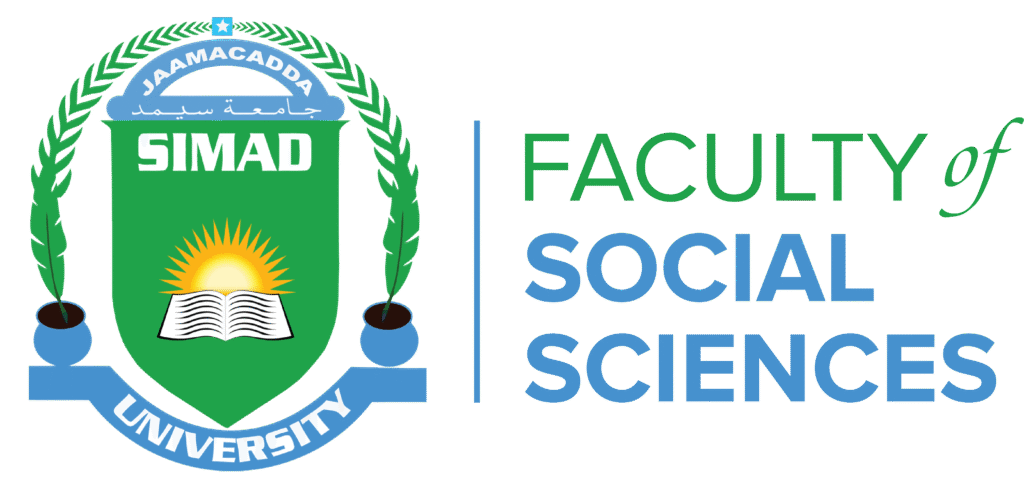Media and Communications
Introduction
The media landscape is evolving rapidly across broadcast, digital, and social platforms.
At SIMAD University, the Bachelor of Media & Communication program equips students with
the knowledge and practical skills to thrive as clear, ethical communicators across TV, radio, online news,
public relations, and digital content. Students learn how media works in society, how to write and speak effectively,
and how to create and distribute content on multiple platforms through coursework, projects, and internships.
Program Goals
The program is designed to:
- Build a strong foundation in journalism, public relations, digital media, and media ethics.
- Develop clear writing, speaking, and storytelling skills for multi-platform communication.
- Strengthen critical thinking, research, and audience analysis to inform effective messaging.
- Promote professional standards and ethical practice in media and communication roles.
Program Objectives
By completing the program, students will:
- Understand how media systems operate and shape public discourse across platforms.
- Create content for TV, radio, online news, and social media using modern production workflows.
- Plan and execute PR campaigns and digital communication strategies.
- Apply media law and ethics to responsible, audience-appropriate communication.
- Build a professional portfolio through hands-on projects, internships, and media production.
Why Choose This Program?
Our curriculum blends theory with practical production experience:
- Coursework across journalism, PR, and digital media with strong writing and speaking focus.
- Hands-on content creation and newsroom-style projects that mirror real industry practice.
- Internships and media production work that build employable skills and a portfolio.
- Training in media ethics, audience engagement, and platform analytics.
Career Opportunities
Graduates are prepared for roles such as:
- Journalist / Reporter / News Producer
- Public Relations Officer / Communications Specialist
- Digital Content Creator / Social Media Manager
- Corporate Communications / Brand Storyteller
- Media Researcher / Copywriter / Editor
- Broadcast Presenter (TV/Radio) / Podcast Producer
- Digital Marketing Associate / Community Manager
- Completion of secondary school with a minimum overall average of 50%
- Should bring the original and a copy of secondary school certificate
- Should bring Six (6) passport size photos with white background
- Should bring the original copy of a letter of good conduct issued by your secondary school
- Should bring a sponsorship letter from your guardian
- Should successfully pass an admission interview and/or test
- Pay non-refundable Processing and ID card fees of USD $50 (bank draft)
Course Structure
The Bachelor of Media & Communication combines core theory with studio practice, newsroom projects, and campaign work. A typical pathway includes:
- Foundations
- Introduction to Media & Society
- Writing for Media (News & Features)
- Public Speaking & Presentation
- Digital Media Fundamentals
- Core Production & Platforms
- Broadcast Production (TV & Radio)
- Online Newsroom & Multimedia Reporting
- Social Media Strategy & Community Management
- Photography & Visual Storytelling
- Communication Strategy
- Public Relations Principles & Campaigns
- Brand Messaging & Corporate Communication
- Audience Research & Analytics
- Media Law & Ethics
- Advanced & Applied
- Feature Writing & Long-form Content
- Content Production Workshop (Cross-platform)
- Crisis Communication & Reputation Management
- Entrepreneurship in Media
- Capstone & Professional Preparation
- Internship / Industry Placement
- Media Production Portfolio
- Final Project / Campaign
Full time: 5 Years
Fees($): $315.00
Charges($): $30.00
Total($): $345.00
STUDENTS FEES PAYMENT POLICY
This policy applies to all students, these include: part-time and full-time for both undergraduate and postgraduate and any other person enrolled as a student at the University:
- Option one: At the beginning of the semester, all semester fees can be paid in full.
- Option two: At the beginning of the semester, students should pay 30% of semester fees before he/she registers for the class. In the second installment, 40% of the semester fees should be paid before the midterm exam. The remaining 30% of the semester fees should be paid before the final exam.
- After payments of second and third installments, students are eligible to get their clearance cards for midterm and final exams.
- Fees Collector officer will be responsible to check fees default when he/she gets a report from the head of the cash unit.
- SU will not refund any fees paid unless the student has no remaining semester.
- Students and sponsors who unintentionally or intentionally deposit fees will not be refunded but will be forwarded to the next semesters.
- Upon graduation period, all extra fees balance should be refunded to the students.
- Any student who temporarily or permanently breaks his/her study can request an extra fee refund.
- Head of Cash Unit should check the activities of the sponsors.
Bank Accounts
Premier Bank: 20300001001
Dahabshiil: 1822
Salam Bank: 30027598
Idman Community Bank: 7401005
IBS Bank: 1820
The SU academic year consists of 42 weeks split into two semesters of 18 weeks each, the first beginning in August.
